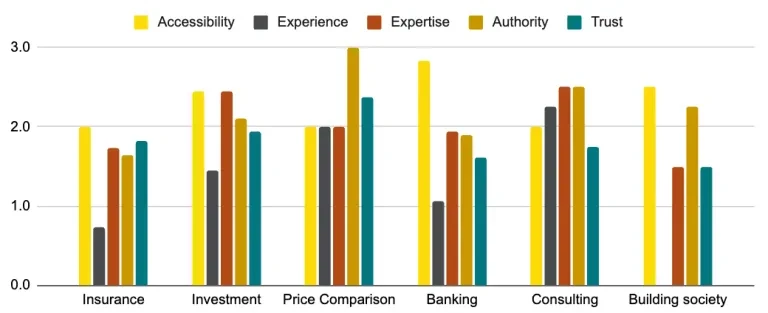Analysis by the UK’s first financial services digital marketing agency, Balance, found that guidance based on Google’s EEAT guidelines and the FCA’s Consumer Duty aren’t being followed.
The agency analysed 50 household-known websites across the main sectors of financial services, and gave each website a score across the four areas of Google’s EEAT recommendations: Experience, Expertise, Authority and Trust.

The scores out of 12, 3 for each part of EEAT, are:
- Price comparison websites – 9.4
- Consulting firms – 9
- Investment firms – 7.9
- Banks- 6.5
- Insurance brands – 5.9
- Building societies – 5.3
Out of 50 websites analysed, 49 failed to achieve top marks across all of the areas. The one site with a perfect score belonged in the Price Comparison sector. One bank received zero points. Both the highest and lowest scorers are household brands used by millions of British consumers each year.
Price comparison websites, which dominate the buying behaviour in some categories, seem to rack in the highest scores, with an average score of 9.4 thanks to their high performance in Trust and Authority.
However, they were weak at evidencing Expertise. This is troubling given how many consumers use these websites and read their articles when making financial decisions.
Meanwhile, building societies were the worst performing sector, scoring less than half at 5.3/12, primarily due to poor scores in the Experience category.
Alex Murphy, Co-Founder and CMO at Balance, the financial services digital marketing agency, commented on the research:
“While many marketers are looking how to make their businesses perform better in Google, and many compliance teams have a keen eye on Consumer Duty, no one else appears to be noticing the gaps between the two. In this lies a huge opportunity for financial services companies, but more importantly, to join the dots to a better experience for customers.
The results we found were troubling, especially with Consumer Duty looming in July 2023 and an economic downturn meaning businesses are fighting to survive and correct financial choices are more important than ever for consumers. Financial services needs a new way of thinking in order to support their customers.”
EEAT comprises a number of ranking factors that Google uses to judge the quality of a website. It is more important for financial services firms to get this right, as they fall within the “your money or your life” category which undergoes increased scrutiny by Google.
Murphy added:
“Consumer Duty asks financial services brands to improve their online communications. The finding that stood out to me the most is, while the FCA is asking brands to “increase trust in the sector” a huge 84% of the websites we audited are not ticking all the trust boxes, with over a third scoring very low or not even scoring at all.”
Balance is running a webinar in June that looks into this in more detail and how finance brands can adhere to guidelines. They will be joined by Sophia Glennon, Senior Industry Manager at Google, who will also talk about the latest financial sector trends in search.














